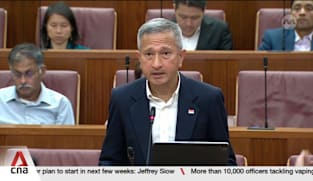Debate on President’s Address: Sylvia Lim on ‘marshalling the whole of society’ against ageism
For Singapore to fully harness the energy of every citizen, it must foster a dynamic environment where ageist stereotypes, prejudice and discrimination are “blown away”, said MP Sylvia Lim. Speaking in Parliament on Tuesday (Apr 18), she pointed out that this is not something for the Government to do alone, but requires “marshalling the whole of society”. She urged Singaporeans to examine themselves to see how they can individually contribute to this endeavour in their everyday interactions. “If Singapore is to be built to last, we must together build a Singapore for all ages,” she said. She noted that at a policy level, there are positives in Singapore, with many health-related initiatives towards active ageing. On the employment front, there are policies to incentivise employers to hire older workers. Apart from laws and policies, two other strategies that are likely to have more impact are public education and increasing inter-generational contacts. She suggested reviewing the education curriculum from the primary to tertiary levels to remove any ageist stereotypes and dispel any misconceptions about certain age groups. Another aspect is to watch public discourse, including debates in Parliament, she said. “Ministers and MPs should avoid making statements that may inadvertently perpetuate ageism, such as ‘by the year 2030, we will face a silver tsunami’, which evokes all the wrong images,” she said.
For Singapore to fully harness the energy of every citizen, it must foster a dynamic environment where ageist stereotypes, prejudice and discrimination are “blown away”, said MP Sylvia Lim. Speaking in Parliament on Tuesday (Apr 18), she pointed out that this is not something for the Government to do alone, but requires “marshalling the whole of society”. She urged Singaporeans to examine themselves to see how they can individually contribute to this endeavour in their everyday interactions. “If Singapore is to be built to last, we must together build a Singapore for all ages,” she said. She noted that at a policy level, there are positives in Singapore, with many health-related initiatives towards active ageing. On the employment front, there are policies to incentivise employers to hire older workers. Apart from laws and policies, two other strategies that are likely to have more impact are public education and increasing inter-generational contacts. She suggested reviewing the education curriculum from the primary to tertiary levels to remove any ageist stereotypes and dispel any misconceptions about certain age groups. Another aspect is to watch public discourse, including debates in Parliament, she said. “Ministers and MPs should avoid making statements that may inadvertently perpetuate ageism, such as ‘by the year 2030, we will face a silver tsunami’, which evokes all the wrong images,” she said.



















